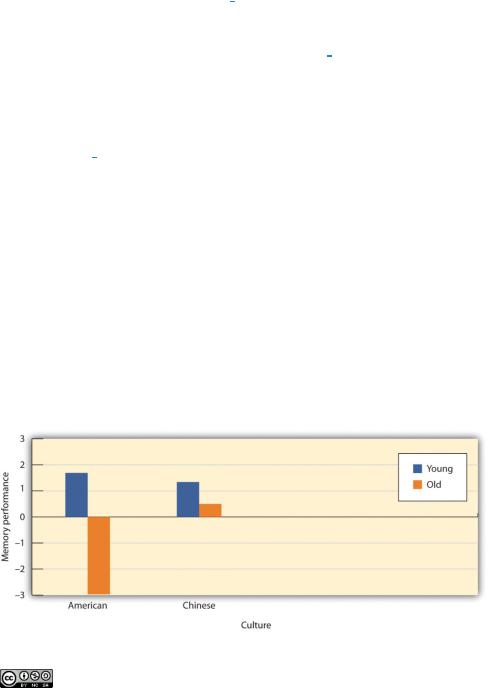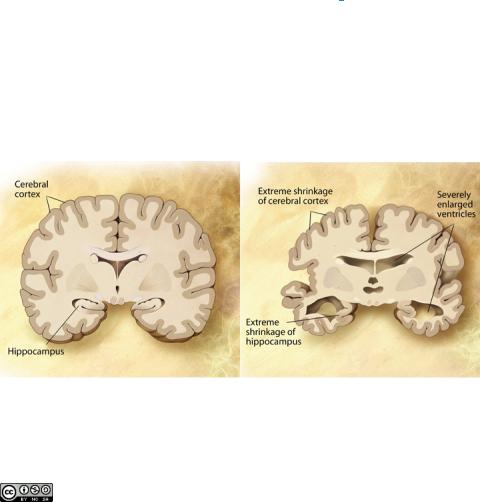
- •Preface
- •Approach and Pedagogy
- •Chapter 1
- •Introducing Psychology
- •1.1 Psychology as a Science
- •The Problem of Intuition
- •Research Focus: Unconscious Preferences for the Letters of Our Own Name
- •Why Psychologists Rely on Empirical Methods
- •Levels of Explanation in Psychology
- •The Challenges of Studying Psychology
- •1.2 The Evolution of Psychology: History, Approaches, and Questions
- •Early Psychologists
- •Structuralism: Introspection and the Awareness of Subjective Experience
- •Functionalism and Evolutionary Psychology
- •Psychodynamic Psychology
- •Behaviorism and the Question of Free Will
- •Research Focus: Do We Have Free Will?
- •The Cognitive Approach and Cognitive Neuroscience
- •The War of the Ghosts
- •Social-Cultural Psychology
- •The Many Disciplines of Psychology
- •Psychology in Everyday Life: How to Effectively Learn and Remember
- •1.3 Chapter Summary
- •Chapter 2
- •Psychological Science
- •Psychological Journals
- •2.1 Psychologists Use the Scientific Method to Guide Their Research
- •The Scientific Method
- •Laws and Theories as Organizing Principles
- •The Research Hypothesis
- •Conducting Ethical Research
- •Characteristics of an Ethical Research Project Using Human Participants
- •Ensuring That Research Is Ethical
- •Research With Animals
- •APA Guidelines on Humane Care and Use of Animals in Research
- •Descriptive Research: Assessing the Current State of Affairs
- •Correlational Research: Seeking Relationships Among Variables
- •Experimental Research: Understanding the Causes of Behavior
- •Research Focus: Video Games and Aggression
- •2.3 You Can Be an Informed Consumer of Psychological Research
- •Threats to the Validity of Research
- •Psychology in Everyday Life: Critically Evaluating the Validity of Websites
- •2.4 Chapter Summary
- •Chapter 3
- •Brains, Bodies, and Behavior
- •Did a Neurological Disorder Cause a Musician to Compose Boléro and an Artist to Paint It 66 Years Later?
- •3.1 The Neuron Is the Building Block of the Nervous System
- •Neurons Communicate Using Electricity and Chemicals
- •Video Clip: The Electrochemical Action of the Neuron
- •Neurotransmitters: The Body’s Chemical Messengers
- •3.2 Our Brains Control Our Thoughts, Feelings, and Behavior
- •The Old Brain: Wired for Survival
- •The Cerebral Cortex Creates Consciousness and Thinking
- •Functions of the Cortex
- •The Brain Is Flexible: Neuroplasticity
- •Research Focus: Identifying the Unique Functions of the Left and Right Hemispheres Using Split-Brain Patients
- •Psychology in Everyday Life: Why Are Some People Left-Handed?
- •3.3 Psychologists Study the Brain Using Many Different Methods
- •Lesions Provide a Picture of What Is Missing
- •Recording Electrical Activity in the Brain
- •Peeking Inside the Brain: Neuroimaging
- •Research Focus: Cyberostracism
- •3.4 Putting It All Together: The Nervous System and the Endocrine System
- •Electrical Control of Behavior: The Nervous System
- •The Body’s Chemicals Help Control Behavior: The Endocrine System
- •3.5 Chapter Summary
- •Chapter 4
- •Sensing and Perceiving
- •Misperception by Those Trained to Accurately Perceive a Threat
- •4.1 We Experience Our World Through Sensation
- •Sensory Thresholds: What Can We Experience?
- •Link
- •Measuring Sensation
- •Research Focus: Influence without Awareness
- •4.2 Seeing
- •The Sensing Eye and the Perceiving Visual Cortex
- •Perceiving Color
- •Perceiving Form
- •Perceiving Depth
- •Perceiving Motion
- •Beta Effect and Phi Phenomenon
- •4.3 Hearing
- •Hearing Loss
- •4.4 Tasting, Smelling, and Touching
- •Tasting
- •Smelling
- •Touching
- •Experiencing Pain
- •4.5 Accuracy and Inaccuracy in Perception
- •How the Perceptual System Interprets the Environment
- •Video Clip: The McGurk Effect
- •Video Clip: Selective Attention
- •Illusions
- •The Important Role of Expectations in Perception
- •Psychology in Everyday Life: How Understanding Sensation and Perception Can Save Lives
- •4.6 Chapter Summary
- •Chapter 5
- •States of Consciousness
- •An Unconscious Killing
- •5.1 Sleeping and Dreaming Revitalize Us for Action
- •Research Focus: Circadian Rhythms Influence the Use of Stereotypes in Social Judgments
- •Sleep Stages: Moving Through the Night
- •Sleep Disorders: Problems in Sleeping
- •The Heavy Costs of Not Sleeping
- •Dreams and Dreaming
- •5.2 Altering Consciousness With Psychoactive Drugs
- •Speeding Up the Brain With Stimulants: Caffeine, Nicotine, Cocaine, and Amphetamines
- •Slowing Down the Brain With Depressants: Alcohol, Barbiturates and Benzodiazepines, and Toxic Inhalants
- •Opioids: Opium, Morphine, Heroin, and Codeine
- •Hallucinogens: Cannabis, Mescaline, and LSD
- •Why We Use Psychoactive Drugs
- •Research Focus: Risk Tolerance Predicts Cigarette Use
- •5.3 Altering Consciousness Without Drugs
- •Changing Behavior Through Suggestion: The Power of Hypnosis
- •Reducing Sensation to Alter Consciousness: Sensory Deprivation
- •Meditation
- •Video Clip: Try Meditation
- •Psychology in Everyday Life: The Need to Escape Everyday Consciousness
- •5.4 Chapter Summary
- •Chapter 6
- •Growing and Developing
- •The Repository for Germinal Choice
- •6.1 Conception and Prenatal Development
- •The Zygote
- •The Embryo
- •The Fetus
- •How the Environment Can Affect the Vulnerable Fetus
- •6.2 Infancy and Childhood: Exploring and Learning
- •The Newborn Arrives With Many Behaviors Intact
- •Research Focus: Using the Habituation Technique to Study What Infants Know
- •Cognitive Development During Childhood
- •Video Clip: Object Permanence
- •Social Development During Childhood
- •Knowing the Self: The Development of the Self-Concept
- •Video Clip: The Harlows’ Monkeys
- •Video Clip: The Strange Situation
- •Research Focus: Using a Longitudinal Research Design to Assess the Stability of Attachment
- •6.3 Adolescence: Developing Independence and Identity
- •Physical Changes in Adolescence
- •Cognitive Development in Adolescence
- •Social Development in Adolescence
- •Developing Moral Reasoning: Kohlberg’s Theory
- •Video Clip: People Being Interviewed About Kohlberg’s Stages
- •6.4 Early and Middle Adulthood: Building Effective Lives
- •Psychology in Everyday Life: What Makes a Good Parent?
- •Physical and Cognitive Changes in Early and Middle Adulthood
- •Menopause
- •Social Changes in Early and Middle Adulthood
- •6.5 Late Adulthood: Aging, Retiring, and Bereavement
- •Cognitive Changes During Aging
- •Dementia and Alzheimer’s Disease
- •Social Changes During Aging: Retiring Effectively
- •Death, Dying, and Bereavement
- •6.6 Chapter Summary
- •Chapter 7
- •Learning
- •My Story of Posttraumatic Stress Disorder
- •7.1 Learning by Association: Classical Conditioning
- •Pavlov Demonstrates Conditioning in Dogs
- •The Persistence and Extinction of Conditioning
- •The Role of Nature in Classical Conditioning
- •How Reinforcement and Punishment Influence Behavior: The Research of Thorndike and Skinner
- •Video Clip: Thorndike’s Puzzle Box
- •Creating Complex Behaviors Through Operant Conditioning
- •7.3 Learning by Insight and Observation
- •Observational Learning: Learning by Watching
- •Video Clip: Bandura Discussing Clips From His Modeling Studies
- •Research Focus: The Effects of Violent Video Games on Aggression
- •7.4 Using the Principles of Learning to Understand Everyday Behavior
- •Using Classical Conditioning in Advertising
- •Video Clip: Television Ads
- •Psychology in Everyday Life: Operant Conditioning in the Classroom
- •Reinforcement in Social Dilemmas
- •7.5 Chapter Summary
- •Chapter 8
- •Remembering and Judging
- •She Was Certain, but She Was Wrong
- •Differences between Brains and Computers
- •Video Clip: Kim Peek
- •8.1 Memories as Types and Stages
- •Explicit Memory
- •Implicit Memory
- •Research Focus: Priming Outside Awareness Influences Behavior
- •Stages of Memory: Sensory, Short-Term, and Long-Term Memory
- •Sensory Memory
- •Short-Term Memory
- •8.2 How We Remember: Cues to Improving Memory
- •Encoding and Storage: How Our Perceptions Become Memories
- •Research Focus: Elaboration and Memory
- •Using the Contributions of Hermann Ebbinghaus to Improve Your Memory
- •Retrieval
- •Retrieval Demonstration
- •States and Capital Cities
- •The Structure of LTM: Categories, Prototypes, and Schemas
- •The Biology of Memory
- •8.3 Accuracy and Inaccuracy in Memory and Cognition
- •Source Monitoring: Did It Really Happen?
- •Schematic Processing: Distortions Based on Expectations
- •Misinformation Effects: How Information That Comes Later Can Distort Memory
- •Overconfidence
- •Heuristic Processing: Availability and Representativeness
- •Salience and Cognitive Accessibility
- •Counterfactual Thinking
- •Psychology in Everyday Life: Cognitive Biases in the Real World
- •8.4 Chapter Summary
- •Chapter 9
- •Intelligence and Language
- •How We Talk (or Do Not Talk) about Intelligence
- •9.1 Defining and Measuring Intelligence
- •General (g) Versus Specific (s) Intelligences
- •Measuring Intelligence: Standardization and the Intelligence Quotient
- •The Biology of Intelligence
- •Is Intelligence Nature or Nurture?
- •Psychology in Everyday Life: Emotional Intelligence
- •9.2 The Social, Cultural, and Political Aspects of Intelligence
- •Extremes of Intelligence: Retardation and Giftedness
- •Extremely Low Intelligence
- •Extremely High Intelligence
- •Sex Differences in Intelligence
- •Racial Differences in Intelligence
- •Research Focus: Stereotype Threat
- •9.3 Communicating With Others: The Development and Use of Language
- •The Components of Language
- •Examples in Which Syntax Is Correct but the Interpretation Can Be Ambiguous
- •The Biology and Development of Language
- •Research Focus: When Can We Best Learn Language? Testing the Critical Period Hypothesis
- •Learning Language
- •How Children Learn Language: Theories of Language Acquisition
- •Bilingualism and Cognitive Development
- •Can Animals Learn Language?
- •Video Clip: Language Recognition in Bonobos
- •Language and Perception
- •9.4 Chapter Summary
- •Chapter 10
- •Emotions and Motivations
- •Captain Sullenberger Conquers His Emotions
- •10.1 The Experience of Emotion
- •Video Clip: The Basic Emotions
- •The Cannon-Bard and James-Lange Theories of Emotion
- •Research Focus: Misattributing Arousal
- •Communicating Emotion
- •10.2 Stress: The Unseen Killer
- •The Negative Effects of Stress
- •Stressors in Our Everyday Lives
- •Responses to Stress
- •Managing Stress
- •Emotion Regulation
- •Research Focus: Emotion Regulation Takes Effort
- •10.3 Positive Emotions: The Power of Happiness
- •Finding Happiness Through Our Connections With Others
- •What Makes Us Happy?
- •10.4 Two Fundamental Human Motivations: Eating and Mating
- •Eating: Healthy Choices Make Healthy Lives
- •Obesity
- •Sex: The Most Important Human Behavior
- •The Experience of Sex
- •The Many Varieties of Sexual Behavior
- •Psychology in Everyday Life: Regulating Emotions to Improve Our Health
- •10.5 Chapter Summary
- •Chapter 11
- •Personality
- •Identical Twins Reunited after 35 Years
- •11.1 Personality and Behavior: Approaches and Measurement
- •Personality as Traits
- •Example of a Trait Measure
- •Situational Influences on Personality
- •The MMPI and Projective Tests
- •Psychology in Everyday Life: Leaders and Leadership
- •11.2 The Origins of Personality
- •Psychodynamic Theories of Personality: The Role of the Unconscious
- •Id, Ego, and Superego
- •Research Focus: How the Fear of Death Causes Aggressive Behavior
- •Strengths and Limitations of Freudian and Neo-Freudian Approaches
- •Focusing on the Self: Humanism and Self-Actualization
- •Research Focus: Self-Discrepancies, Anxiety, and Depression
- •Studying Personality Using Behavioral Genetics
- •Studying Personality Using Molecular Genetics
- •Reviewing the Literature: Is Our Genetics Our Destiny?
- •11.4 Chapter Summary
- •Chapter 12
- •Defining Psychological Disorders
- •When Minor Body Imperfections Lead to Suicide
- •12.1 Psychological Disorder: What Makes a Behavior “Abnormal”?
- •Defining Disorder
- •Psychology in Everyday Life: Combating the Stigma of Abnormal Behavior
- •Diagnosing Disorder: The DSM
- •Diagnosis or Overdiagnosis? ADHD, Autistic Disorder, and Asperger’s Disorder
- •Attention-Deficit/Hyperactivity Disorder (ADHD)
- •Autistic Disorder and Asperger’s Disorder
- •12.2 Anxiety and Dissociative Disorders: Fearing the World Around Us
- •Generalized Anxiety Disorder
- •Panic Disorder
- •Phobias
- •Obsessive-Compulsive Disorders
- •Posttraumatic Stress Disorder (PTSD)
- •Dissociative Disorders: Losing the Self to Avoid Anxiety
- •Dissociative Amnesia and Fugue
- •Dissociative Identity Disorder
- •Explaining Anxiety and Dissociation Disorders
- •12.3 Mood Disorders: Emotions as Illness
- •Behaviors Associated with Depression
- •Dysthymia and Major Depressive Disorder
- •Bipolar Disorder
- •Explaining Mood Disorders
- •Research Focus: Using Molecular Genetics to Unravel the Causes of Depression
- •12.4 Schizophrenia: The Edge of Reality and Consciousness
- •Symptoms of Schizophrenia
- •Explaining Schizophrenia
- •12.5 Personality Disorders
- •Borderline Personality Disorder
- •Research Focus: Affective and Cognitive Deficits in BPD
- •Antisocial Personality Disorder (APD)
- •12.6 Somatoform, Factitious, and Sexual Disorders
- •Somatoform and Factitious Disorders
- •Sexual Disorders
- •Disorders of Sexual Function
- •Paraphilias
- •12.7 Chapter Summary
- •Chapter 13
- •Treating Psychological Disorders
- •Therapy on Four Legs
- •13.1 Reducing Disorder by Confronting It: Psychotherapy
- •DSM-IV-TR Criteria for Diagnosing Attention-Deficit/Hyperactivity Disorder (ADHD)
- •Psychology in Everyday Life: Seeking Treatment for Psychological Difficulties
- •Psychodynamic Therapy
- •Important Characteristics and Experiences in Psychoanalysis
- •Humanistic Therapies
- •Behavioral Aspects of CBT
- •Cognitive Aspects of CBT
- •Combination (Eclectic) Approaches to Therapy
- •13.2 Reducing Disorder Biologically: Drug and Brain Therapy
- •Drug Therapies
- •Using Stimulants to Treat ADHD
- •Antidepressant Medications
- •Antianxiety Medications
- •Antipsychotic Medications
- •Direct Brain Intervention Therapies
- •13.3 Reducing Disorder by Changing the Social Situation
- •Group, Couples, and Family Therapy
- •Self-Help Groups
- •Community Mental Health: Service and Prevention
- •Some Risk Factors for Psychological Disorders
- •Research Focus: The Implicit Association Test as a Behavioral Marker for Suicide
- •13.4 Evaluating Treatment and Prevention: What Works?
- •Effectiveness of Psychological Therapy
- •Research Focus: Meta-Analyzing Clinical Outcomes
- •Effectiveness of Biomedical Therapies
- •Effectiveness of Social-Community Approaches
- •13.5 Chapter Summary
- •Chapter 14
- •Psychology in Our Social Lives
- •Binge Drinking and the Death of a Homecoming Queen
- •14.1 Social Cognition: Making Sense of Ourselvesand Others
- •Perceiving Others
- •Forming Judgments on the Basis of Appearance: Stereotyping, Prejudice, and Discrimination
- •Implicit Association Test
- •Research Focus: Forming Judgments of People in Seconds
- •Close Relationships
- •Causal Attribution: Forming Judgments by Observing Behavior
- •Attitudes and Behavior
- •14.2 Interacting With Others: Helping, Hurting, and Conforming
- •Helping Others: Altruism Helps Create Harmonious Relationships
- •Why Are We Altruistic?
- •How the Presence of Others Can Reduce Helping
- •Video Clip: The Case of Kitty Genovese
- •Human Aggression: An Adaptive yet Potentially Damaging Behavior
- •The Ability to Aggress Is Part of Human Nature
- •Negative Experiences Increase Aggression
- •Viewing Violent Media Increases Aggression
- •Video Clip
- •Research Focus: The Culture of Honor
- •Conformity and Obedience: How Social Influence Creates Social Norms
- •Video Clip
- •Do We Always Conform?
- •14.3 Working With Others: The Costs and Benefits of Social Groups
- •Working in Front of Others: Social Facilitation and Social Inhibition
- •Working Together in Groups
- •Psychology in Everyday Life: Do Juries Make Good Decisions?
- •Using Groups Effectively
- •14.4 Chapter Summary

National Center for Health Statistics, Centers for Disease Control and Prevention,
website:http://www.cdc.gov/nchs/data/series/sr_23/sr23_028.pdf
[19]Twenge, J., Campbell, W., & Foster, C. (2003). Parenthood and marital satisfaction: A meta-analytic review. Journal of Marriage and Family, 65(3), 574–583.
[20]Eid, M., & Larsen, R. J. (Eds.). (2008). The science of subjective well-being. New York, NY: Guilford Press.
6.5 Late Adulthood: Aging, Retiring, and Bereavement
L E A R N I N G O B J E C T I V E S
1.Review the physical, cognitive, and social changes that accompany late adulthood.
2.Describe the psychological and physical outcomes of bereavement.
We have seen that, over the course of their lives, most individuals are able to develop secure attachments; reason cognitively, socially and morally; and create families and find appropriate careers. Eventually, however, as people enter into their 60s and beyond, the aging process leads to faster changes in our physical, cognitive, and social capabilities and needs, and life begins to come to its natural conclusion, resulting in the final life stage, beginning in the 60s, known
as late adulthood.
Despite the fact that the body and mind are slowing, most older adults nevertheless maintain an active lifestyle, remain as happy or are happier than when they were younger, and increasingly value their social connections with family and friends (Angner, Ray, Saag, & Allison,
2009). [1] Kennedy, Mather, and Carstensen (2004) [2] found that people’s memories of their lives
became more positive with age, and Myers and Diener (1996) [3] found that older adults tended to speak more positively about events in their lives, particularly their relationships with friends and family, than did younger adults.
Cognitive Changes During Aging
The changes associated with aging do not affect everyone in the same way, and they do not necessarily interfere with a healthy life. Former Beatles drummer Ringo Starr celebrated his 70th birthday in 2010 by playing at Radio City Music Hall, and Rolling Stones singer Mick Jagger (who once supposedly said, “I’d rather be dead than singing ‘Satisfaction’ at 45”) continues to
Saylor URL: http://www.saylor.org/books |
Saylor.org |
|
303 |

perform as he pushes 70. The golfer Tom Watson almost won the 2010 British Open golf tournament at the age of 59, playing against competitors in their 20s and 30s. And people such as the financier Warren Buffet, U.S. Senator Frank Lautenberg, and actress Betty White, each in their 80s, all enjoy highly productive and energetic lives.
Researchers are beginning to better understand the factors that allow some people to age better than others. For one, research has found that the people who are best able to adjust well to changing situations early in life are also able to better adjust later in life (Rubin, 2007; Sroufe, Collins, Egeland, & Carlson, 2009). [4] Perceptions also matter. People who believe that the elderly are sick, vulnerable, and grumpy often act according to such beliefs (Nemmers, 2005),[5] and Levy, Slade, Kunkel, and Kasl (2002) [6] found that the elderly who had more positive perceptions about aging also lived longer.
In one important study concerning the role of expectations on memory, Becca Levy and Ellen Langer (1994) [7] found that, although young American and Chinese students performed equally well on cognitive tasks, older Americans performed significantly more poorly on those tasks than did their Chinese counterparts. Furthermore, this difference was explained by beliefs about aging—in both cultures, the older adults who believed that memory declined with age also showed more actual memory declines than did the older adults who believed that memory did not decline with age. In addition, more older Americans than older Chinese believed that memory declined with age, and as you can see in Figure 6.13, older Americans performed more poorly on the memory tasks.
Figure 6.13
Saylor URL: http://www.saylor.org/books |
Saylor.org |
|
304 |

Is Memory Influenced by Cultural Stereotypes? Levy and Langer (1994) found that although younger samples did not differ, older Americans performed significantly more poorly on memory tasks than did older Chinese, and that these differences were due to different expectations about memory in the two cultures.
Source: Adapted from Levy, B., & Langer, E. (1994). Aging free from negative stereotypes: Successful memory in China among the American deaf. Journal of Personality and Social Psychology, 66(6), 989–997.
Whereas it was once believed that almost all older adults suffered from a generalized memory loss, research now indicates that healthy older adults actually experience only some particular types of memory deficits, while other types of memory remain relatively intact or may even improve with age. Older adults do seem to process information more slowly—it may take them longer to evaluate information and to understand language, and it takes them longer, on average, than it does younger people, to recall a word that they know, even though they are perfectly able to recognize the word once they see it (Burke, Shafto, Craik, & Salthouse, 2008). [8] Older adults also have more difficulty inhibiting and controlling their attention (Persad, Abeles, Zacks, & Denburg, 2002), [9] making them, for example, more likely to talk about topics that are not
relevant to the topic at hand when conversing (Pushkar et al., 2000). [10]
But slower processing and less accurate executive control does not always mean worse memory, or even worse intelligence. Perhaps the elderly are slower in part because they simply have more knowledge. Indeed, older adults have more crystallized intelligence—that is, general knowledge about the world, as reflected in semantic knowledge, vocabulary, and language. As a result, adults generally outperform younger people on measures of history, geography, and even on crossword puzzles, where this information is useful (Salthouse, 2004). [11] It is this superior knowledge combined with a slower and more complete processing style, along with a more sophisticated understanding of the workings of the world around them, that gives the elderly the advantage of “wisdom” over the advantages of fluid intelligence—the ability to think and acquire information quickly and abstractly—which favor the young (Baltes, Staudinger, & Lindenberger, 1999; Scheibe, Kunzmann, & Baltes, 2009).[12]
The differential changes in crystallized versus fluid intelligence help explain why the elderly do not necessarily show poorer performance on tasks that also require experience (i.e., crystallized intelligence), although they show poorer memory overall. A young chess player may think more
Saylor URL: http://www.saylor.org/books |
Saylor.org |
|
305 |

quickly, for instance, but a more experienced chess player has more knowledge to draw on. Older adults are also more effective at understanding the nuances of social interactions than younger adults are, in part because they have more experience in relationships (Blanchard-Fields, Mienaltowski, & Seay, 2007).[13]
Dementia and Alzheimer’s Disease
Some older adults suffer from biologically based cognitive impairments in which the brain is so adversely affected by aging that it becomes very difficult for the person to continue to function effectively. Dementia is defined as a progressive neurological disease that includes loss of cognitive abilities significant enough to interfere with everyday behaviors, and
Alzheimer’s disease is a form of dementia that, over a period of years, leads to a loss of emotions, cognitions, and physical functioning, and which is ultimately fatal. Dementia and Alzheimer’s disease are most likely to be observed in individuals who are 65 and older, and the likelihood of developing Alzheimer’s doubles about every 5 years after age 65. After age 85, the risk reaches nearly 8% per year (Hebert et al., 1995). [14] Dementia and Alzheimer’s disease both produce a gradual decline in functioning of the brain cells that produce the neurotransmitter acetylcholine. Without this neurotransmitter, the neurons are unable to communicate, leaving the brain less and less functional.
Figure 6.14 A Healthy Brain (Left) Versus a Brain With Advanced Alzheimer’s Disease (Right)
Dementia and Alzheimer’s are in part heritable, but there is increasing evidence that the environment also plays a role. And current research is helping us understand the things that older
Saylor URL: http://www.saylor.org/books |
Saylor.org |
|
306 |
